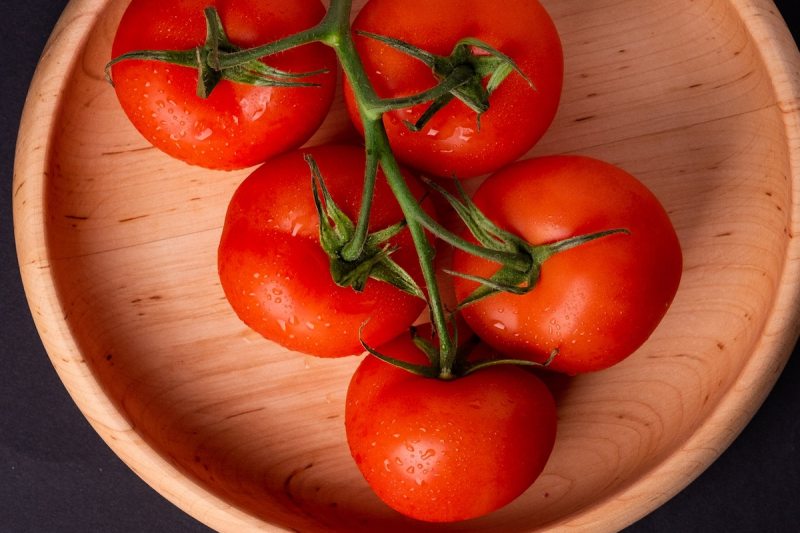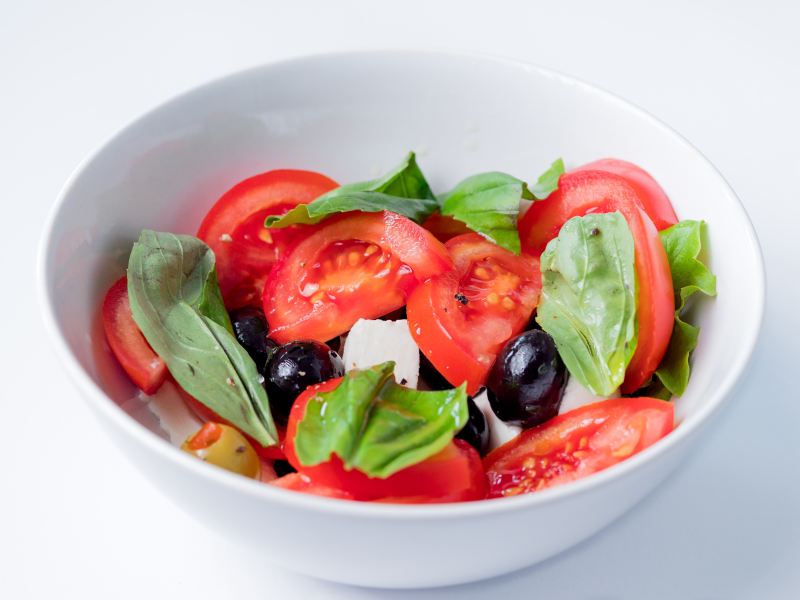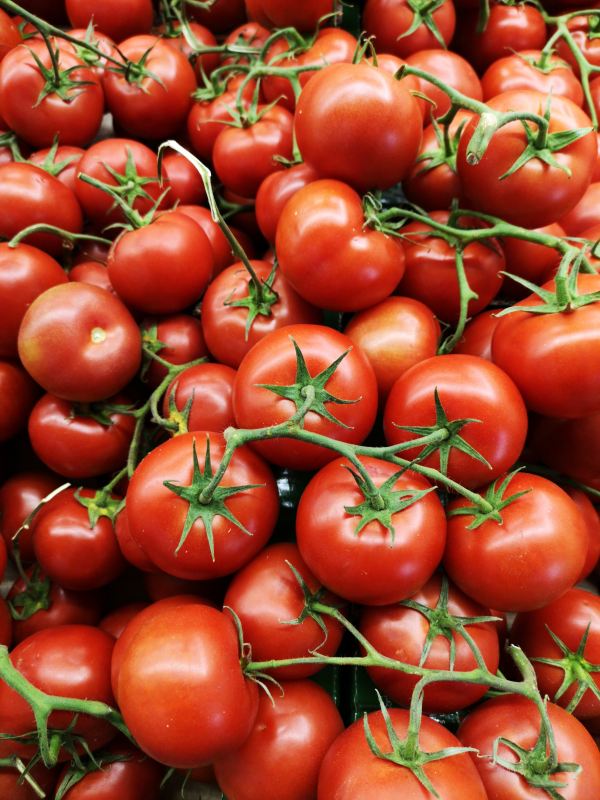
The vibrant red tomato is a popular and beloved fruit with a unique sweet taste and a range of health benefits. The most notable antioxidant found in tomatoes, lycopene, has been linked to a reduced risk of heart disease and more. The rich color of tomatoes is all thanks to lycopene and other carotenoids and chlorophylls.
Whether you’re whipping up an Italian-inspired pasta dish with tomato sauce, a Caprese salad, or simply adding slices to your sandwich, there are plenty of reasons to include tomatoes in your diet. This is what you need to know about tomato nutrition.

The nutritional profile of tomatoes
Botanically speaking, tomatoes or Solanum lycopersicum are a fruit from the nightshade family, but they’re typically prepared and used as a vegetable. Originating in South America, the tomato is usually a round or oval-shaped food and comes in different sizes and colors, including red, green, orange, and purple.
Juicy tomatoes are 95% water with only 5% fiber and carbohydrates. The carbs in tomatoes are really low, making them suitable for the ketogenic and low-carb diet. Of the fiber in tomatoes, 87% of it is insoluble, so it doesn’t dissolve in water and remains intact, traveling through your digestive tract. The calories in tomatoes are also low, so they fit into most weight-loss diets. A 100-gram serving of Roma tomatoes only has 22 calories.
Despite the sweet taste, tomatoes are especially low in sugar and high in important vitamins and nutrients like folate and vitamin A or beta-carotene. A 100-gram serving of Roma tomatoes provides 17.8 milligrams of vitamin C and 193 milligrams of potassium. Vitamin C is one of the most powerful immune-boosting antioxidant vitamins, and potassium is a mineral that plays an important role in heart disease prevention and blood pressure control.

What are the benefits of eating tomatoes?
Are tomatoes good for you? The answer is yes, these natural delicious fruits provide numerous health benefits, including lowering inflammation and boosting vision and heart health.
Heart health
A study of middle-aged men revealed that low blood levels of beta-carotene and lycopene were associated with a higher risk of strokes and heart attacks. Replenishing your beta-carotene and lycopene levels by eating nutritious foods like tomatoes could lower your risk of heart attacks and strokes. Research shows tomatoes are protective for blood vessels and reduce the risk of blood clotting.
Tomatoes are also a good idea for heart health because of the heart-protective nutrients like potassium and potent antioxidants like chlorogenic acid, which have been shown to lower blood pressure. Another study showed that taking lycopene as a supplement could bring down LDL (bad) cholesterol markers.
Interesting clinical studies highlight how tomatoes and tomato products can decrease inflammation and oxidative stress. Inflammation is heavily involved with a multitude of chronic health conditions, including heart problems and autoimmune diseases.
Anti-inflammatory
The anti-inflammatory compounds in tomatoes are just another reason to eat them. Along with antioxidants like beta-carotene, tomatoes contain antioxidant agents called flavonoids. Naringenin is one of these flavonoids present in the skin of tomatoes. In animal studies, researchers have concluded that naringenin can decrease inflammation and protect against several diseases.
Eye health
Your eyes help you to navigate the world around you, and the carotenoids in tomatoes could help preserve your eye health. Researchers discovered two carotenoids — lutein and zeaxanthin — assist in the prevention of cataracts and age-related macular degeneration.
Your body turns beta-carotene that’s in tomatoes into vitamin A (retinol), which is another key nutrient for eye health. Vitamin A helps you see in low lighting, and a severe deficiency of this crucial vitamin can lead to night blindness and a serious eye condition called xerophthalmia.
Skin health
Your skin is your protective barrier and your biggest organ. Research reveals tomato-based foods high in lycopene and other plant compounds could protect against sunburns. In one 10-week study, participants ate 1.3 ounces of tomato paste (16 mg of lycopene) daily with olive oil. The results were an impressive 40% reduction in sunburns.
Hydration
According to Civic Science, nearly half of adults in the U.S. aren’t drinking enough water. Tomatoes are hydrating because they’re 95% water and provide potassium — an electrolyte that supports hydration and maintains proper fluid balance.

How can you incorporate tomatoes into your diet?
Here are just some of the tasty ways you can incorporate tomatoes into your diet:
- Make a salad.
- Scramble them up with eggs or add them to an omelet.
- Roast them with your favorite veggies.
- Try sun-dried tomatoes.
- Place them on kebab skewers alongside grilled chicken or steak.
- Make fresh tomato sauce for your favorite pasta dish.
- Stir-fry them.
- Add them to your sandwich.
- Place them on top of flatbread.
- Place chicken salad or egg salad on top of thick tomato slices.
- Make your own salsa.
- Make tomato soup.

Is tomato the healthiest fruit?
Tomato is quite possibly one of the healthiest flavor-bursting fruits because it’s low in sugar and high in nutrients, not to mention the research on the plant compounds that are protective against disease and degeneration. There’s nothing quite like a zesty salsa, a colorful chef salad piled high, or a warm bowl of tomato soup lightly coated with melting cheese. You can pluck this versatile fruit from the vine and enjoy all the delicious flavors and health benefits that come with it.
Editors' Recommendations
- How much protein do you really need? Here’s how to calculate it
- We love these Keto diet Thanksgiving recipes from a professional chef
- Cranberries are great for your health: RDs reveal how to add them to your diet this winter
- Salmon, coconut oil, chia seeds, and more: The best foods to fight inflammation
- Oatmeal is the secret to better sleep (and you’re going to love this hack)




